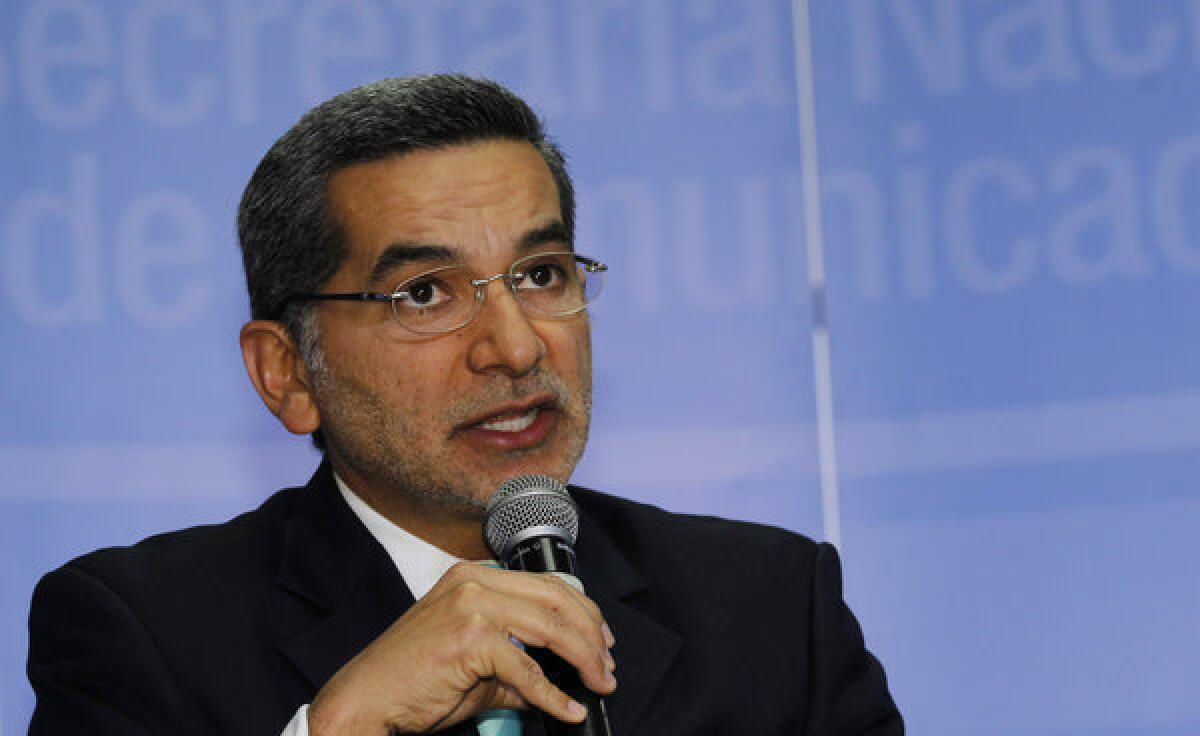Ecuador quits U.S. trade deal to avoid ‘blackmail’ over Snowden

- Share via
QUITO, Ecuador -- Ecuador on Thursday announced it was withdrawing from a 2-decade-old trade pact with the United States, saying the agreement left the South American nation vulnerable to “blackmail” as U.S. officials seek the return of fugitive Edward Snowden.
The trade agreement was already at risk of not being renewed by the U.S. Congress before Ecuador began weighing whether to grant asylum to Snowden, the former contract worker for the National Security Agency who recently revealed extensive U.S. tracking of telephone communications and then fled from Hawaii to Hong Kong.
Snowden, 30, is now believed to be holed up at the transit section of Moscow’s Sheremetyevo airport while seeking a route to Ecuador or somewhere else that might grant him shelter.
PHOTOS: Famous document leakers
At an early morning news conference, Ecuadorean Communications Secretary Fernando Alvarado said the decision to forgo the Andean Trade Promotion and Drug Eradication Act agreement was “irreversible” and was made to avoid Ecuador being vulnerable to pressure from the U.S. over Snowden.
“Ecuador renounces in a unilateral and irrevocable way these trade preferences,” Alvarado said, adding that in turn it was offering the U.S. a subsidy of $23 million -- the amount he said Ecuadorean traders benefited from the deal -- in human rights training.
Snowden faces felony espionage charges at home. The U.S. has demanded his extradition, first from Hong Kong, where he hid for several weeks, and now from Russia, where he arrived aboard a flight Sunday.
“Ecuador does not accept pressure or threats from anyone nor do we traffic with principles nor submit to commercial interests, as important as they may be,” Alvarado said, adding that the trade breaks have been converted into an “instrument of blackmail.”
An estimated $400 million in Ecuadorean cut flowers, lumber, broccoli, tuna and other products have entered the U.S. market duty free each year since the early 1990s. The trade breaks are offered as an incentive for Ecuador to join in the fight against cocaine traffickers.
Ecuadorean business leaders acknowledged in interviews this week that chances of the breaks being renewed after they expire June 30 were slim, given opposition in the U.S. Congress on political grounds. President Rafael Correa’s granting of political asylum last year to Julian Assange, founder of the secrets-revealing website WikiLeaks, had already cost the country support, businesspeople here said.
At one time, the trade breaks were given to Colombia, Peru and Bolivia as well, all cocaine-producing countries. But Colombia and Peru each have negotiated permanent free-trade deals with the U.S. and so don’t need the agreement’s breaks, which are temporary and renewed annually. Bolivia was excluded several years ago after it expelled U.S. Drug Enforcement Administration agents and liberalized coca farming laws.
Alvarado criticized the U.S. government for not responding to his government’s extradition requests for several businesspeople living in the U.S. who were allegedly responsible for a 1999 bank failure and economic crisis.
Alvarado also denied reports Wednesday that his government had already given Snowden temporary travel documents permitting him to travel to Ecuador. Such documents reportedly are necessary for Snowden to purchase a commercial airline ticket in the absence of a valid passport. His U.S. passport was revoked this week.
ALSO:
Global Voices: Top British diplomat touts UK ‘soft power’
In Africa, Obama reflects on Nelson Mandela’s role in his life
South Africans hold their breath as Nelson Mandela’s health worsens
More to Read
Sign up for Essential California
The most important California stories and recommendations in your inbox every morning.
You may occasionally receive promotional content from the Los Angeles Times.













